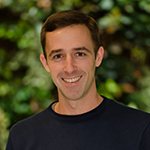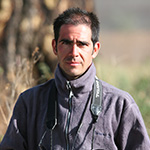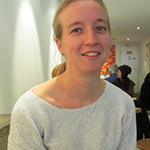Postdoctoral Researchers
 Drew Cronin – Drexel University
Drew Cronin – Drexel University
Drew received his Ph.D. working with Dr. Gail Hearn at Drexel University. His research focuses on understanding the relationship between bushmeat hunting and its impacts on primate populations on Bioko Island, Equatorial Guinea. This research has involved extensive training and subsequent management of local primate monitoring teams, in an effort to bridge the gaps between monitoring, analysis, and application of field data in a conservation context. His other research interests include studying avian diversity in the Bioko highlands and the ecology of Pennant’s red colobus (Procolobus pennantii). Drew also teaches a number of field courses on Bioko for American and Equatoguinean undergraduate students.
 Janina Dordel – Drexel University
Janina Dordel – Drexel University
Janina is a post-doctoral research fellow at Drexel University. As a member of Dr. Mary Katherine Gonder's lab she will be using whole genome sequences of chimpanzee subspecies to develop a high resolution SNP typing scheme. This will help to quickly type and analyze newly collected non-invasive samples for use in population genomic analyses. Using this information will also enable us to understand the mechanisms shaping the genetic structure of these populations. After receiving a PhD in bioinformatics and microbiology she worked as a post-doc at the Sanger-Institute, UK, where she used whole genome and extensive epidemiological data to reconstruct the evolution as well as transmission patterns of pathogenic bacteria.
 David Fernandez – Bioko Biodiversity Protection Program
David Fernandez – Bioko Biodiversity Protection Program
Dr. Fernandez is a post-doctoral research associate with the Bioko Biodiversity Protection Program through Drexel University and Universidad Nacional de Guinea Ecuatorial. Dr. Fernandez is a biological anthropologist specializing in primate behavioral ecology. His previous research has centered on female reproductive strategies, intersexual conflict, reproductive endocrinology and primate conservation. On Bioko, Dr. Fernandez is the BBPP in-country manager. His current research interests are in the impact of development on wildlife within protected areas, particularly primates. Dr. Fernandez received his Ph.D. in Biological Anthropology from Stony Brook University, New York.
 Trevon Fuller – Center for Tropical Research, UCLA
Trevon Fuller – Center for Tropical Research, UCLA
Dr. Fuller is a postdoctoral researcher at the Center for Tropical Research at the Institute of the Environment and Sustainability at the University of California, Los Angeles. Under the supervision of Professor Walter Allen, he will contribute to the PIRE project by collecting and analyzing socio-economic data to inform the conservation of biodiversity in Central Africa. Dr. Fuller will carry out analysis at the macro-scale on logging and mining concessions, patterns of population growth, migration and urbanization and local socioeconomic indicators of household income and consumption. Multivariate statistical analyses and qualitative information will be used to decipher complex causal relationships amongst variables at this scale. At the micro-level scale, Dr. Fuller will use instruments such as focus groups, interviews, and questionnaires to maximize opportunities for conserving reservoirs of adaptive genetic diversity while minimizing the costs to human populations. The results of the proposed work will be used to design national and trans-boundary protected areas in Cameroon and Gabon.
 Ryan Harrigan – Center for Tropical Research, UCLA
Ryan Harrigan – Center for Tropical Research, UCLA
Dr. Harrigan is a postdoctoral researcher at the Center for Tropical Research in the Institute of the Environment and Sustainability at the University of California, Los Angeles. As part of the PIRE project, Dr. Harrigan will be developing genetic markers for a range of species within Central Africa to identify regions that harbor high genetic diversity. These markers will be developed using the latest molecular methods, including the implementation of single nucleotide polymorphisms (SNPs), Restriction-site Associated DNA (RAD) tags, and whole transcriptome (the regions of DNA that are translated to proteins) assemblies. Dr. Harrigan’s previous work in Central Africa has included the modeling of species distributions, behavior, morphology, and parasite prevalence, and spatially predicting how these models might change under a warming world. Dr. Harrigan will apply these methods and the lessons learned to the broad diversity of taxa being studied under this exciting PIRE-sponsored project.
 Matthew Mitchell – Drexel University
Matthew Mitchell – Drexel University
Matt is a post-doctoral researcher at Drexel University. He received his Ph.D. working with Dr. Mary Katherine Gonder at the University at Albany – State University of New York. His research is focused on understanding the relationship between chimpanzee genetic diversity and patterns of speciation with environmental variability. Part of his dissertation research also involved investigating the differences in sex-specific patterns of chimpanzee social structure by using genetic markers. Matt has been working in Cameroon since 2011 with Dr. Gonder, collecting non-invasive chimpanzee fecal samples used for DNA extraction. He also holds a Graduate Certificate in Geographic Information Systems (GIS) and incorporates a range of spatial modeling techniques into his research.
 Katy Morgan – University of New Orleans
Katy Morgan – University of New Orleans
I have broad interests in molecular ecology, tropical biodiversity and population genetics. During my PhD I worked on Anopheles mosquitoes within Southeast Asia, focusing on the roles of historical climate change and ecological heterogeneity in driving population divergence and speciation events. After receiving my PhD from the University of Manchester, I moved to the Max Planck Institute in Tübingen to begin working on the population genetics and genomics of island nematodes. I will join the PIRE project in May 2013 and am looking forward to the move into conservation genetics. I will play a role in coordinating research activities, working with other project members to model environmentally-associated genomic and phenotypic variation within the range of study taxa, and to integrate evolutionary and socio-economic data into a conservation prioritization scheme. I will also be responsible for coordinating fieldwork in Gabon and Cameroon, and will help organize annual undergraduate and graduate educational programs in Gabon.




